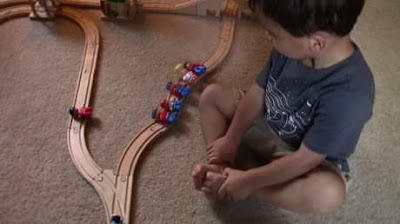This fine young fellow is experiencing the
Trolley Problem. His father has asked him to decide which way the train should
go. One path kills one toy person, the other kills five. He simply moves the
one toy person to the track full of toy people and with much delight pushes the train over all of
them.
The Trolley Problem is an
example of a thought experiment in ethics. The problem asks you to decide which
is most ethical – allowing five people to die or causing the death of one in
order to save the others. As is typically true of thought experiments there is
no correct answer.
We really do
not need to be philosophers to invent a dilemma such as the
Trolley Problem. We are self-centered sinners living in a sinful world. Our
lives create ethical problems all around us. When we are particularly
self-centered we simply ignore the dilemma in the name of “rights.”
One such
dilemma is abortion. Abortion is an easy choice when we think we are granting freedom.
It is an easy choice when we feel we are champions of human rights. It seems so
right to allow someone choice over life decisions when we only consider the
life of one person.
But abortion
is not about the life of one person. It is its own trolley problem. Do we end
the life of one baby in order to preserve the quality of life of one woman and
possibly her family?
I suspect
that abortion is rarely a thoughtless decision. It costs money, it may have
health repercussions, it changes a woman’s life much as a pregnancy does. Yet,
it is only possible if we forget the second life on the other decision track.
For many
women who undergo an abortion, to not do this procedure would create much
hardship. Some women feel they cannot afford a child, some do not want to
make this life change, some do not feel
they can be a mother to a child with a
disability, some women are battling an illness that may take their life if
their pregnancy continues. Abortion is not an easy problem. It only becomes an easy
solution when we forget the life of the child.
This is the ethical
dilemma of our times. How can we call ourselves tolerant when our tolerance
only extends to those who live outside the womb? How can we call ourselves
ethical when we make it legal to kill those who cannot cry out for help? How
can we call ourselves human when we care nothing for the lives of these
infants?
We have simply erased the ethical problem by erasing the existence of
the life. We have
decided that life begins when a woman decides she wants the baby. Life does not begin at conception, it does not begin at birth. It begins with the decision of a mother to want, to be happy, to accept. There is no science found here.
This makes
no sense. It is a thought experiment that is resolved by making the decision to
not think, to not consider, to not care.
This
ignoring of a life does not seem to stop with the unborn child. Once we can
make the decision to allow this death it becomes easy to encourage others to
die. Those who have lives we do not wish to have should want to die. We do not have to decide for them to die; we do not have to do the killing. We will just let them realize their life is not valued and then they will want to die. We might work hard to stop some suicides, but look the other way for the self-induced death of those whose lives we no longer value. Death becomes a friend, or at least a solution, instead of the enemy we know it to be.
For this reason I bow my knees before the Father, from whom every family in heaven and on earth is named, that according to the riches of his glory he may grant you to be strengthened with power through his Spirit in your inner being, so that Christ may dwell in your hearts through faith - that you, being rooted and grounded in love, may have strength to comprehend with all the saints what is the breadth ad length and height and depth, and to know the love of Christ that surpasses knowledge, that you may be filled with the fullness of God. Ephesians 3:14-19, ESV
When we think we can solve world problems we create more trouble than we
can know or understand. We think we are intelligent. We think we are
sophisticated. We think we can create a better world through philosophy,
industry, or perhaps technology.
We think this, but we are wrong.
We are the same as the toddler in the first clip. He does not yet have
the mental capacity to see the problem his father has created with his toys. He
does not know about death; he knows only about play. The symbolism is lost on
him.
There is so much more that is lost on us! As advanced as we humans
imagine ourselves to be, there is more about the world that we do not
understand than there is information found archived on the internet.
We cannot know God’s plan for our daily lives. We can only see His plan
for our Salvation.
We cannot know God. We can only experience His love for us.
Through the power of that love we can read and study His Word, worship
His holy name, and joyfully receive forgiveness and faith through the sacraments.
We can rejoice in the sacredness of being God’s child.



No comments:
Post a Comment